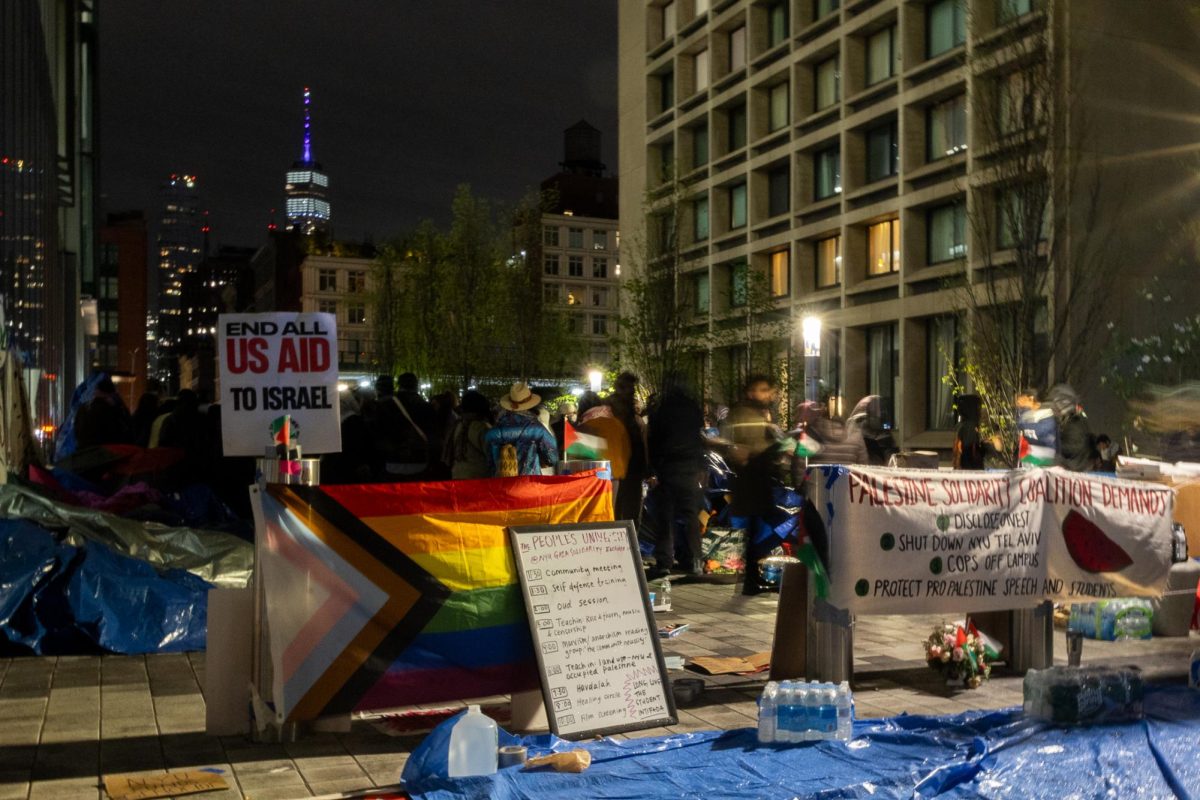Chair of the board of trustees Evan Chesler expressed the board’s “complete confidence in and full support” of President Linda Mills and “her efforts to keep the campus safe” in a statement to WSN, after the majority of full-time Gallatin faculty voted that they “have no confidence in the leadership” of Mills last week. Faculty representatives in the University Senate also expressed support for Mills.
The vote came just one day after NYU authorized the New York City Police Department to arrest students and faculty at a pro-Palestinian encampment in Gould Plaza. Out of 64 eligible voters, 44 voted “yes” in a no-confidence vote on Mills’ leadership, while two voted “no” and nine others abstained, according to an April 26 letter to NYU leadership obtained by WSN.
Gallatin professor Jacob Remes said that while only NYU’s board of trustees has the ability to remove Mills from her position, the vote is an example of “soft power,” an approach meant to help attract the support of others. The board of trustees is responsible for appointing the president, “setting the overarching strategic direction of the university” and “ensuring accountability of the president’s leadership team.”
“The key aspects of what the university does is done by the faculty,” Remes said. “If the faculty doesn’t have confidence in the administration, the whole thing grinds to a halt.”
The executive committees of the Tenured and Tenure-track Faculty Senators Council and the Continuing Contract Faculty Senators Council — the two groups representing faculty in the University Senate — have voiced support for Mills, NYU spokesperson John Beckman told WSN.
“The TFSC Executive Committee and the CFSC Steering Committee wish to reaffirm our faith in Linda Mills’ leadership of NYU,” a letter to Mills from Contract Faculty Senators Council leadership reads. “Although some of us agree with the decision to call in the police on the night of April 22 and others disagree, we affirm our overall confidence in her leadership in this time of unprecedented challenges to higher education.”
In the Gallatin faculty letter, Gallatin committee chairs Hallie Franks and Rosalind Fredericks informed Mills, Chesler and interim provost Georgina Dopico of a faculty vote in response to the university’s authorization of police action that put “not only academic freedom but the safety” of the NYU community at risk.
Remes said Gallatin faculty passed a motion to conduct a vote during a regularly scheduled faculty meeting on Tuesday, and voted later in the week. He added that four Gallatin faculty members who were arrested at the encampment on April 22 took part in the meeting.
The meeting came after a university statement responding to the arrests at the encampment, saying there had been “disorderly, disruptive and antagonizing behavior” at the demonstration. The statement, signed by Mills and Campus Safety head Fountain Walker, said protesters who appeared to be unaffiliated with NYU “breached the barriers” outside Gould Plaza, leading to “safety and security” concerns. It also said there had been reports of “intimidating chants and several antisemitic incidents” at the demonstration.
NYU’s chapter of the American Association of University Professors challenged the university’s account of events in a recent statement, saying there was “no breach in barriers by non-NYU ID-holding people” and no intimidation or incidents of antisemitism from those inside the encampment or identified university affiliates.
“A lot of people who voted no confidence were doing so as a way of telling the central administration, in no uncertain terms, do not retaliate. Do not further punish any faculty or any students,” Remes said. “The speed with which we acted, was intended to use whatever power we could to protect our students and protect our colleagues against further retaliation.”
After a previous vote of no confidence against former NYU president John Sexton, Sexton remained in power with the support of the board of trustees. In 2013, faculty within four of the university’s schools voted against Sexton in a series of no-confidence votes, with NYU’s School of Law voting in his favor.
Faculty from other academic institutions, including Barnard College, Emory University and Indiana University Bloomington, have also called for votes of no confidence in their presidents due to their responses to encampments at their respective campuses. Barnard’s chapter of the AAUP unanimously issued a vote of no confidence in the school’s president, Laura Rosenbury, last week.
Update, April 29: This article has been updated with additional information from a university spokesperson.
Correction, April 29: This article previously misstated the number of Gallatin faculty who were arrested and the date the Gallatin no-confidence vote occurred. The article also implied that Gallatin committee chairs Hallie Frank and Rosalind Fredericks emailed Mills on their own behalf rather than on behalf of the faculty. The article has been corrected, and WSN regrets the error.
Contact Bruna Horvath at [email protected].
























































































































































